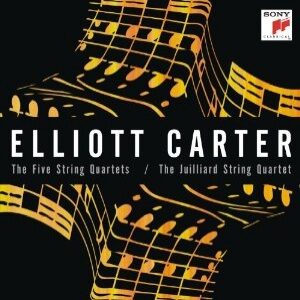From a purely heuristic perspective, the Carter quartets represent an astonishing achievement, adumbrating the medium’s almost mystical reputation for musical sublimity while retaining traditional notational conventions. It didn’t have to be that way. Epistemologically speaking, the works build on the tradition of the Second Viennese School, with some Bartók and, perhaps, Ives thrown in for good measure. After all, as Ives would have said, there is no particular reason why the four members of a string quartet need to pay special attention to what any of the others are doing, nor, for that matter, should they necessarily sound like four players at all. In his Third Quartet, especially, with its two simultaneous atonal duos pursuing independent courses throughout, Carter puts this theory into vivid practice.
Partly as a result, these quartets enjoy a fearsome reputation for their difficulty and complexity. As an ontological proposition, this is nonsense. They require little more than a willingness to listen and accept whatever motivic element bobs to the surface at any particular time. In the first two quartets, traditional forms and expressive topoi remain clearly detectable, but even in the late Fifth Quartet of 1995 Carter takes pains to ensure that his inimitable energy and joie de vivre never compromise expressive directness. Consider, for example, two versions of the work’s principal thesis (I hesitate to call it a melody in the traditional sense), one resolutely determined, the other a witty scherzando in which delicious pizzicato timbres evoke the strumming of Flamenco guitars and Catalan folk music in the manner of Roberto Gerhard (sound clips).
When these performances first appeared they were considered remarkable by virtue of the fact that the Juilliard Quartet (or anyone) could play the music at all. Since then, while not exactly repertory pieces, the music has achieved a level of acceptance beyond the merely hagiographic, and the quartets have received fairly regular performances and recordings. If the early Juilliard performances haven’t quite the same measure of executional ease that we hear from the Pacifica Quartet on Naxos, you can argue that the few moments of stress and strain belong to the music’s aural persona. In any case, this set represents a major achievement, a long time in coming.
































